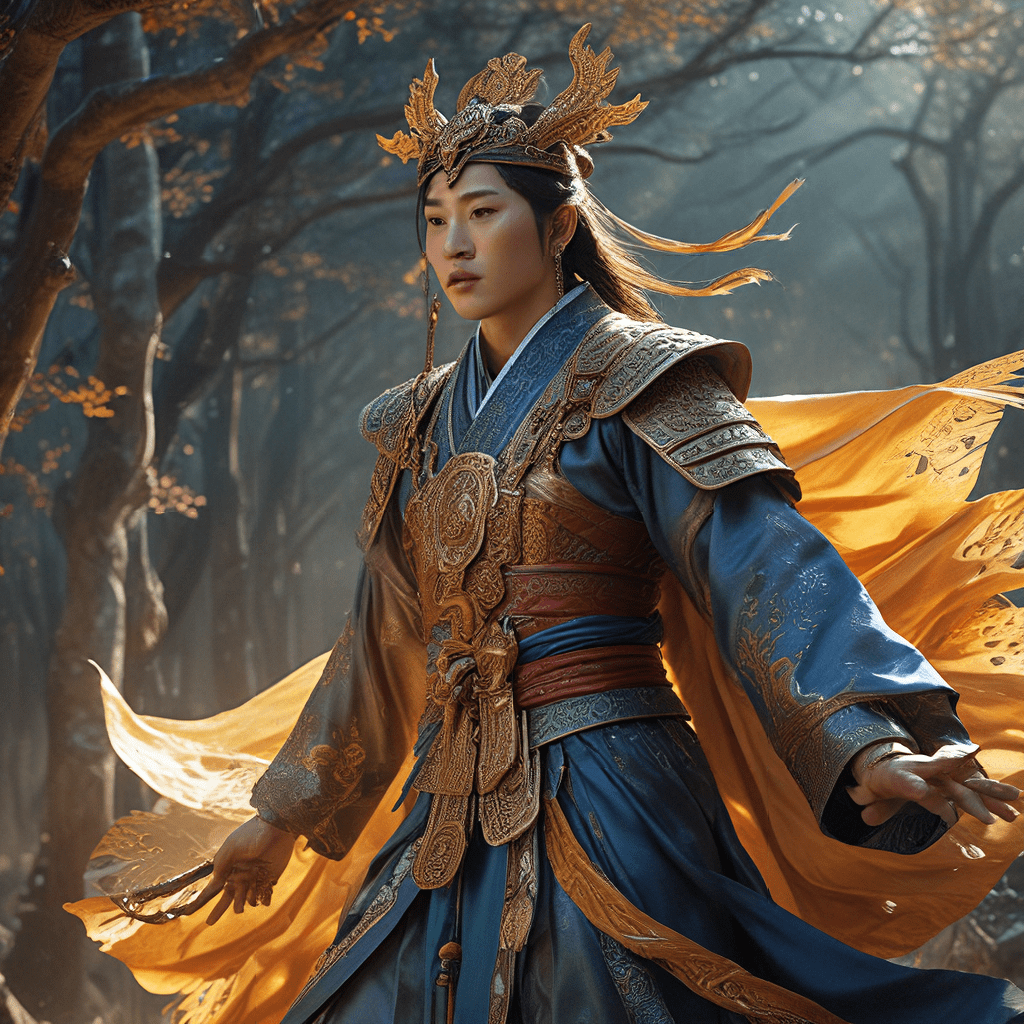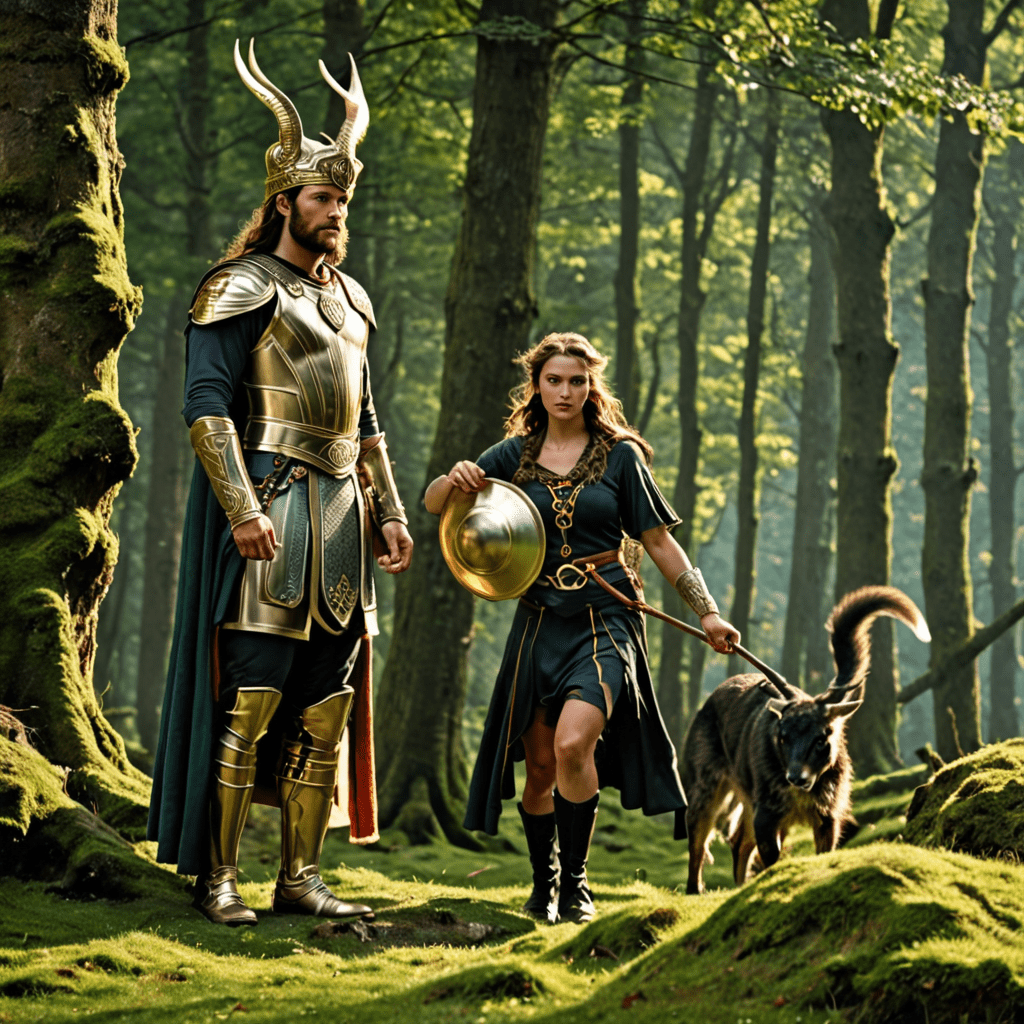The Korean Creation Myth: A Tale of Divine Descent
In the heart of Korean mythology lies a fascinating tale of creation, a story that resonates with the cultural identity and history of the Korean people. This myth, known as the "Dangun myth," narrates the origin of the Korean nation, tracing its lineage back to a divine being named Hwanung, the Son of Heaven. This captivating narrative, passed down through generations, not only explains the origins of the Korean people but also reflects their beliefs about the universe, their place in it, and the divine forces that shape their destiny.
Hwanung: The Son of Heaven
At the center of the Korean creation myth stands Hwanung, a celestial being who embodies the power and authority of Heaven. He is described as the son of Hwanin, the Lord of Heaven, who embodies the ultimate cosmic power and governs the heavens. Hwanung's divine lineage grants him exceptional powers and the ability to influence the earthly realm. As the son of Heaven, he holds a unique position, bridging the gap between the celestial and the terrestrial.
Hwanung's role in the Korean creation myth is not simply a passive one. He is an active participant in the formation of the Korean nation, embodying the divine mandate to create order and civilization on Earth. He represents the divine principle of order, justice, and governance, qualities that become foundational to Korean culture and identity.
The Descent from Heaven: Hwanung’s Mission to Earth
Hwanung, driven by a divine purpose, undertakes a journey from the heavenly realm to Earth, a mission to establish a new world and guide humanity towards a path of enlightenment. This descent signifies a crucial transition in the Korean creation myth, marking the beginning of the divine intervention in the earthly realm. It is a significant moment, as it marks the transition from a chaotic, primordial state to a more structured and organized world.
Hwanung's descent is not a random occurrence. He is guided by a divine call, a mandate to bring order and civilization to the earthly realm. His journey symbolizes the divine will to create a new world, a world that reflects the values and principles of Heaven. His mission also reveals the interconnectedness between the celestial and the terrestrial, highlighting the divine influence on human affairs.
The Sacred Mountain of Taebaeksan: Hwanung’s Chosen Abode
Upon reaching Earth, Hwanung chooses to establish his abode on Mount Taebaeksan, a majestic mountain revered as a sacred space in Korean tradition. The choice of Taebaeksan, known as the "White Mountain," is significant. It is considered the birthplace of Korean civilization, the site where the foundations of Korean culture and identity were laid.
Taebaeksan holds a special significance in Korean mythology, representing the connection between the celestial and earthly realms. The mountain, with its towering peaks and pristine landscapes, provides a symbolic link to the divine, a place where Heaven meets Earth. This sacred mountain becomes the center of Hwanung's divine realm, a place from which he governs and guides the newly emerging human civilization.
Hwanung’s Divine Council: Establishing Order and Governance
Upon establishing his abode in Taebaeksan, Hwanung establishes a divine council, known as the "Three Great Ministers." This council, consisting of ministers of Heaven, Earth, and Human Affairs, reflects the interconnectedness of all elements of existence. These ministers serve as Hwanung's advisors, assisting him in governing the newly established world and ensuring its proper functioning.
The establishment of the Three Great Ministers represents a crucial step in Hwanung's mission to bring order to the world. It signifies the establishment of a system of governance, a framework to ensure justice and harmony. This divine council serves as a model for future human governance, emphasizing the importance of wise leadership and the need for a balance between celestial, terrestrial, and human affairs.
The Birth of the Korean People: Hwanung and the Bear
The Dangun myth tells the story of the creation of the Korean people through the union of Hwanung and a bear. A bear and a tiger, yearning to become human, sought out Hwanung and requested to be transformed. Hwanung, granting their desire, instructed them to stay in a cave for 100 days, consuming only garlic and mugwort. The tiger, unable to endure the long confinement, left the cave. The bear, however, remained steadfast, completing the trial. Hwanung, witnessing her unwavering commitment, granted her wish, transforming her into a woman named Ungnyeo. Hwanung and Ungnyeo, united in a sacred bond, gave birth to Dangun, the first king of Gojoseon, the legendary first kingdom of Korea.
This tale, filled with symbolic significance, highlights the connection between the divine realm and the emergence of the Korean people. The bear, a symbol of strength, resilience, and loyalty, represents the qualities of the Korean people. Hwanung's role in this transformative act demonstrates his divine power and his connection to the creation of Korean identity. It also emphasizes the importance of perseverance and obedience in Korean culture.
Dangun: The First King of Gojoseon
Dangun, born from the union of Hwanung and Ungnyeo, became the first king of Gojoseon, establishing his kingdom in the heart of the Korean peninsula. He is revered as the mythical ancestor of the Korean people, the founder of their nation and the architect of their civilization. His reign marked the beginning of a new era for the Korean people, symbolizing the transition from a primordial state to a structured and organized society, guided by divine mandate.
The legend of Dangun and Gojoseon is deeply ingrained in Korean history and culture. It provides a narrative framework for understanding the origins of the Korean people, their cultural identity, and their connection to the divine realm. The story of Dangun serves as a source of pride and national unity, reflecting the long and rich history of the Korean people.
The Legacy of Hwanung: A Foundation for Korean Identity
The story of Hwanung, the Son of Heaven, stands as a cornerstone of Korean mythology, profoundly influencing Korean identity. He embodies the divine principles of order, justice, and governance, qualities deeply embedded in Korean culture. His descent to Earth, his establishment of a divine council, and his role in the birth of the Korean people, all reflect the significant influence of divine power in Korean history and culture.
Hwanung's legacy continues to resonate in Korean society, offering a framework for understanding their cultural heritage, their values, and their place in the universe. His story reminds Koreans of their divine connection and inspires them to strive for harmony, order, and justice in their lives.
Interpretations of Hwanung’s Role: Historical and Mythological
The Dangun myth has sparked diverse interpretations throughout history, reflecting evolving perspectives on Korean origins and identity. Some historians view the myth as a reflection of early Korean society, highlighting the importance of leadership, lineage, and divine authority in shaping a unified and structured society. Others see the myth as a reflection of Korean beliefs about cosmic order, connecting the human realm to the divine realm and emphasizing the spiritual foundation of Korean culture.
The story of Hwanung, while rooted in mythology, continues to inspire debate and discussion about Korean history, culture, and identity. The myth, regardless of its specific historical basis, serves as a powerful narrative, transmitting shared values, beliefs, and a sense of national unity.
Hwanung in Contemporary Korean Culture: A Continuing Influence
The legacy of Hwanung continues to inspire contemporary Korean culture. He is prominently featured in Korean literature, art, and folklore, reminding Koreans of their mythical heritage and the importance of their divine connection. His image is often used in national symbols and ceremonies, representing the strength, resilience, and cultural heritage of the Korean people.
The Dangun myth, with its emphasis on divine intervention and the foundation of a new civilization, continues to hold cultural significance in modern Korea. It serves as a reminder of the origins of Korean culture and the enduring values that have shaped their identity.
FAQ
What is the Korean creation myth?
The Korean creation myth, also known as the Dangun myth, tells the story of the origin of the Korean people, tracing their lineage back to a divine being named Hwanung, the Son of Heaven.
Who is Hwanung?
Hwanung is a celestial being, the son of Hwanin, the Lord of Heaven. He is considered the creator of the Korean people and the founder of Gojoseon, the first kingdom of Korea.
What is the significance of Mount Taebaeksan?
Mount Taebaeksan, also known as the "White Mountain," is a sacred mountain in Korean tradition, revered as the birthplace of Korean civilization. It is the site where Hwanung established his abode and governed the newly emerging human civilization.
How was Dangun born?
Dangun, the first king of Gojoseon, was born from the union of Hwanung and Ungnyeo, a woman who was transformed from a bear that completed a 100-day trial.
What is the meaning of the Dangun myth?
The Dangun myth offers a narrative framework for understanding the origins of the Korean people, their cultural identity, and their connection to the divine realm. It reflects the importance of lineage, leadership, and divine authority in Korean history and culture.


